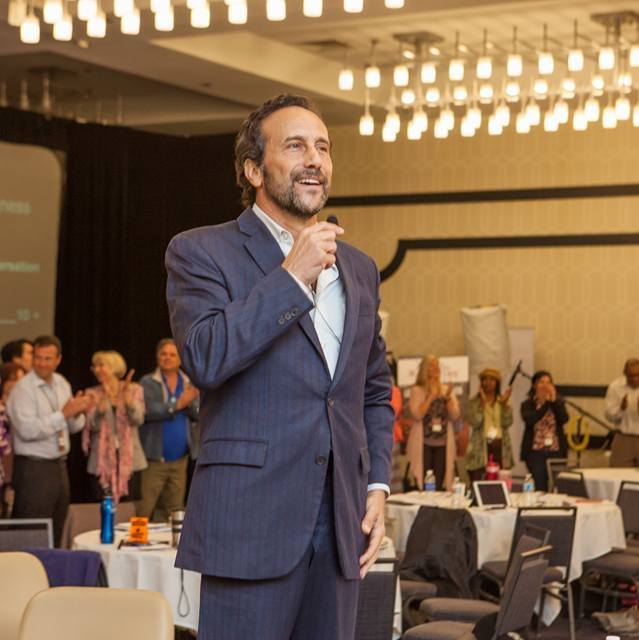Richard Greene is one of the foremost public speakers and communications coaches globally, and he has the work experience to match. He was Princess Diana’s personal speaking coach and an early mentor to Tony Robbins. But he has coached more than them, including countless celebrities, public figures, and politicians. We sat down to pick his brain on what makes a great speech and how he feels our current Presidential candidates are performing on stage.
Richard Greene’s TED Talk, “The 7 Secrets of The Greatest Speakers in History,” has over 3.1 million views, and his book Words That Shook the World:100 Years of Unforgettable Speeches and Events has been a longtime best-seller. Greene shares his skills with audiences through his master courses as a part of the prestigious BBC Maestro program. He’s given over 100 keynote lecture tours in 53 countries on six continents.

I always find myself nervous when it comes to public speaking and don’t think myself a particularly good public speaker. If you had to pick, what are the top three things you believe make a great speaker?
There is really only one top thing, and everything else is a distant second or third! That is “authentic passion.” If you are truly, genuinely, sincerely passionate about EVERYTHING you speak about, it beats out polished expertise and technique every time. The great news is that it is super easy to find one’s “authentic passion” . . . about even the most boring, routine thing that business people or politicians have to speak about.
And to demonstrate that, I do an exercise in my courses where I ask speakers to give me a topic that they think is incapable of any passion . . . and I promise to give a 5-minute, passionate speech about it with 15 to 30 seconds to prepare. I’ve gotten “batteries” or “that glass over there” or “pens” and a thousand other things. But because of the way I trained myself and others, it is really easy to find the excitement and deliver the impromptu speech. And then I have THEM do it . . . and they are blown away by how good they are!
On the secondary list, I’d say the following:
- Have a “CONVERSATION WITH” the audience, not a “performance at” or a “presentation to.”
- Make eye contact with as many people as you possibly can, in a real, conversational way. This is 180 degrees from the INSANE former “gold standard” of looking OVER the heads of the audience . . . or, worse yet, imagining them naked! That is the worst advice ever and only makes people MORE nervous.
- Have four words at the core of your soul whenever you stand up there and speak. “It’s. All. About. Them!” That’s why you’re there, to share things that will help others.
- Use these six words whenever you are about to lose an audience . . . “Let me tell you a story!” and then tell it in the present tense, with lots of vivid detail and with lots of conversation, internal and external!
What are the common pitfalls you see even highly successful entrepreneurs make when they speak publicly?
They don’t do the five things I shared above. Do better at ANY one of those 5, and you will instantly be a better speaker.
And of course, there are other things, but if you are truly there to help them by sharing your product, your services, your new ideas or to simply inspire and motivate them to do wonderful things . . . and you are authentically passionate about WHAT and HOW they can be helped, you will do great, even if some of the technique is not perfect.
America is two weeks away from a pivotal election. How do you feel the Presidential candidates are performing when it comes to their communications style?
I wrote a piece in 2015 predicting that Donald Trump would likely win the Republican nomination and that he could also win the general election. Virtually all of my clients thought I was crazy. Then, after one of the primaries that Trump won, I got a call from a governor I helped elect, and all he could say was, “I thought you went crazy . . . but you were right.”
And I saw it because COMMUNICATION WINS ELECTIONS. The best communicator almost always wins. Look at JFK, look at Reagan, look at Clinton, look at Obama.
Donald Trump paints WAAAAY outside the lines when it comes to his appreciation of political norms, his messaging, his communication strategy and style, and, in the process, alienates many. But of “The 7 Secrets” of great communicators, Donald Trump utilizes and has mastered 6 and 3/4! And if he wins, it is because of the enormously powerful bond and loyalty he creates, in large part, by these 6 and 3/4 secrets!
But, as we have clearly seen, Trump’s significant communication skills only work with certain kinds of people and create overwhelmingly negative responses to others. It’s a personal, NOT a political thing. And, as with everything, it relates to “authenticity.” Those who Trump does not, and will never, reach are unable to get past the almost endless lies, misrepresentations, and obviously insincere statements of grandiosity. If anyone communicated how Trump does in the business world, they would never, ever be respected or trusted and would trigger what I call “The Discount Factor,” where audiences subconsciously multiply what is said by some percentage that they believe is the truth.
Kamala Harris is actually an excellent communicator and has grown tremendously, even since becoming the nominee for the party. She is authentically passionate, has a great connection WITH the audience, has excellent voice tone and body language when she speaks, is getting better on her messaging, and sends out “high frequency,” joyful vibes that Dr. David Hawkins in his landmark book, “Power v. Force” would be impressed by.
But she hasn’t always been, or been seen as, “authentic.” Her laughter, despite what others say, WAS a challenge as it did not always seem authentic, nor exhibiting the kind of “gravitas” one consciously, or subconsciously, looks for in a vice president, and especially a president. But because she is a hard worker when it comes to her communication, she has eliminated virtually all of that and many of the reasons that people used to not be impressed by her.
But, as always, it is MUCH harder for women in the workplace, and in politics, especially at that level. I have little doubt that had Hillary Clinton been a man, she would have won in 2016.
How do you feel vice presidential candidates JD Vance and Tim Walz match up in debates and on stage?
Call me old fashioned, but since “authentic passion” is SO important to me, my own speaking, and my work, I believe it is disqualifying to overtly lie or manipulatively avoid answering a question. When JD Vance refused to answer the question about whether Donald Trump lost the 2020 election, that, in my mind, destroyed his entire, otherwise polished and impressive appearance. You’re either “authentic” or you’re not. There is no middle ground.
And, by the way, when — in business or politics — ALWAYS acknowledge the question — in some sincere way — before you race off into your “talking points.” It’s basic human courtesy and actually makes the interviewer and the entire audience MUCH more receptive to your position.
But, as we saw with Tim Walz, “authenticity” is necessary but not sufficient. While real and plain-spoken and sincere, it seemed to me that Gov. Walz hadn’t really met anyone quite like JD Vance, and he was thrown by it early in the debate. As he got more used to him and the huge pressure of the debate, he became more comfortable and able to go more on offense. These 90-minute debates are like Prize Fights, and one has to have great defense AND offense to land the punches that will define your personal brand.
No matter who wins November 5th, what tips do you have for the victor in terms of addressing the nation and moving forward?
The ONLY way for a leader — in business or politics — to handle this kind of bubbling, volatile situation is to stay centered and become a “sponge” for the excess angers and frustrations around him. I’d immediately sit down with my opponent or his or her team in a nationally televised conversation and wouldn’t say one word. I’d just ask my opponents to talk . . . and wouldn’t object or interject at all . . . until he/she/they were finished. I would then say, “Is there anything else you would like to say to me and the American people?”
This is what I call “The Sponge Technique.” People who are angry are absolutely incapable of listening to reason, or anything, when “their cup is overflowing.” Have to be able to absorb enough of the extra liquid to make room for them to even hear anything at all.
And then, in a very, very calm, un-triggered voice, I would respond to each and every accusation or allegation or condemnation so that the people in the room, and their supporters around the country, could see me as caring about them . . . and not as “the enemy,” at least a little bit.
I would use THE most important communication tool ever, “Pacing & Leading,” as I agreed with what I could agree with (“Yes, some of the results did come in very slowly”) but acknowledge and respect all the others . . . as a way to communicate that I acknowledge and respect THEM! This kind of non-reactive, human conflict resolution practice is ALWAYS effective in reducing, if not eliminating, conflicts. It’s a bit like magic. Robert Kennedy, Sr. did something similar on the night that Dr. Martin Luther King was assassinated when on a campaign visit to Indianapolis, Indiana, in April of 1968, and he so calmed the mostly black crowd that Indianapolis became the only big city in America without a riot that night.
It’s going to be a tough ride . . . and it is quite clear that the two presidential candidates will handle that situation in a VERY different way, to say the least!
If you’re interested in booking Richard or taking his classes, visit his website.
For more information, check out Richard Greene’s work on Substack and TikTok.








